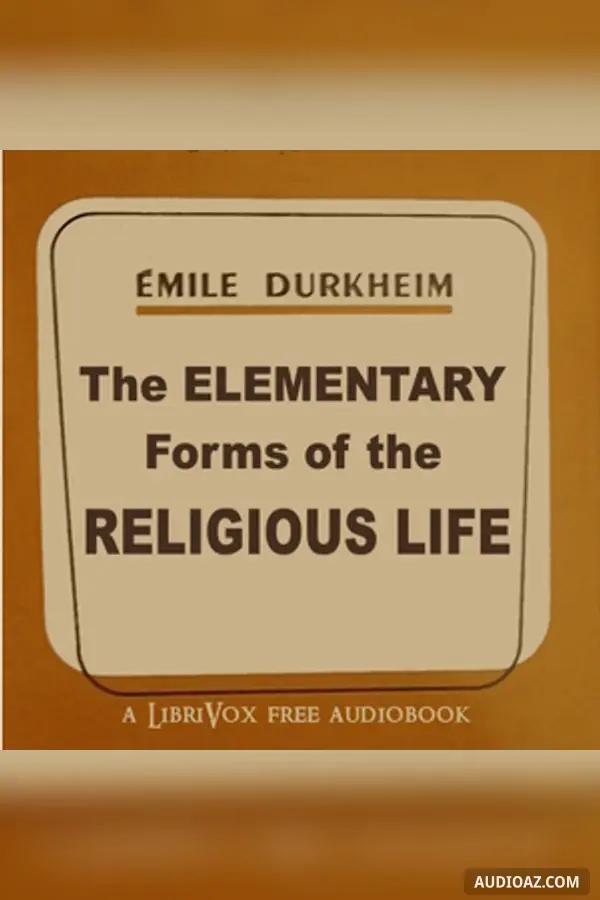
The Elementary Forms of the Religious Life - Free Audiobook
Author(s): Émile Durkheim
Language: English
Genre(s): Christianity - OtherNon-fictionSocial Science (Culture & Anthropology)Religion
1 / 81Introduction, Section I, "Religious Sociology and the Theory of Knowledge"
00:0000:00
81 Chapter(s)
- 1. Introduction, Section I, "Religious Sociology and the Theory of Knowledge"
- 2. Introduction, Section II, "Religious Sociology and the Theory of Knowledge"
- 3. Book I, Chapter I, "Usefulness of a preliminary definition"
- 4. Book I, Chapter I, Section I
- 5. Book I, Chapter I, Section II
- 6. Book I, Chapter I, Section III
- 7. Book I, Chapter I, Section IV
- 8. Book I, Chapter II, "I - Animism"
- 9. Book I, Chapter II, Section I
- 10. Book I, Chapter II, Section II
- 11. Book I, Chapter II, Section III
- 12. Book I, Chapter II, Section IV
- 13. Book I, Chapter II, Section V
- 14. Book I, Chapter III, "II - Naturism"
- 15. Book I, Chapter III, Section I
- 16. Book I, Chapter III, Section II
- 17. Book I, Chapter III, Section III
- 18. Book I, Chapter IV, Section I, "Totemism as an Elementary Religion"
- 19. Book I, Chapter IV, Section II
- 20. Book II, Chapter I, Section I, "The Totem as Name and as Emblem"
- 21. Book II, Chapter I, Section II
- 22. Book II, Chapter I, Section III
- 23. Book II, Chapter II, Section I, "The Totemic Animal and Man"
- 24. Book II, Chapter II, Section II
- 25. Book II, Chapter III, Section I, "The Cosmological System of Totemism and the Idea of Class"
- 26. Book II, Chapter III, Section II
- 27. Book II, Chapter III, Section III
- 28. Book II, Chapter IV, Section I, "The Individual Totem and the Sexual Totem"
- 29. Book II, Chapter IV, Section II
- 30. Book II, Chapter V, Section I, "Critical Examination of Preceding Theories"
- 31. Book II, Chapter V, Section II
- 32. Book II, Chapter V, Section III
- 33. Book II, Chapter V, Section IV
- 34. Book II, Chapter V, Section V
- 35. Book II, Chapter VI, Section I, "The Notion of the Totemic Principle, or Mana, and the Idea of Force"
- 36. Book II, Chapter VI, Section II
- 37. Book II, Chapter VI, Section III
- 38. Book II, Chapter VI, Section IV
- 39. Book II, Chapter VII, Section I, "Origin of the Idea of the Totemic Principle or Mana"
- 40. Book II, Chapter VII, Section II
- 41. Book II, Chapter VII, Section III
- 42. Book II, Chapter VII, Section IV
- 43. Book II, Chapter VII, Section V
- 44. Book II, Chapter VII, Section VI
- 45. Book II, Chapter VIII, Section I, "The Idea of the Soul"
- 46. Book II, Chapter VIII, Section II
- 47. Book II, Chapter VIII, Section III
- 48. Book II, Chapter VIII, Section IV
- 49. Book II, Chapter VIII, Section V
- 50. Book II, Chapter VIII, Section VI
- 51. Book II, Chapter IX, Section I, "The Idea of Spirits and Gods"
- 52. Book II, Chapter IX, Section II
- 53. Book II, Chapter IX, Section III
- 54. Book II, Chapter IX, Section IV
- 55. Book II, Chapter IX, Section V
- 56. Book III, Chapter I, Section I, "The Negative Cult and its Functions, The Ascetic Rites"
- 57. Book III, Chapter I, Section II
- 58. Book III, Chapter I, Section III
- 59. Book III, Chapter I, Section IV
- 60. Book III, Chapter II, "I - The Elements of Sacrifice"
- 61. Book III, Chapter II, Section I
- 62. Book III, Chapter II, Section II
- 63. Book III, Chapter II, Section III
- 64. Book III, Chapter II, Section IV
- 65. Book III, Chapter II, Section V
- 66. Book III, Chapter III, Section I, "The Positive Cult, I. The Elements of Sacrifice"
- 67. Book III, Chapter III, Section II
- 68. Book III, Chapter III, Section III
- 69. Book III, Chapter IV, Section I, "The Positive Cult, II. Imitative Rites and the Principle of Causality"
- 70. Book III, Chapter IV, Section II
- 71. Book III, Chapter IV, Section III
- 72. Book III, Chapter V, "Definition of the piacular rite"
- 73. Book III, Chapter V, Section I
- 74. Book III, Chapter V, Section II
- 75. Book III, Chapter V, Section III
- 76. Book III, Chapter V, Section IV
- 77. Conclusion, "To what extent the results obtained may be generalized"
- 78. Conclusion, Section I
- 79. Conclusion, Section II
- 80. Conclusion, Section III
- 81. Conclusion, Section IV
About
A study and analysis of religion as a social phenomenon by French sociologist Émile Durkheim. (Summary by Erin Stone)
Comments
Be the first to comment
There aren't any comments on this content yet. Start the conversation!
Discover More
Tags: The Elementary Forms of the Religious Life audio, The Elementary Forms of the Religious Life - Émile Durkheim audio, Christianity - Other audio, Non-fiction audio, Social Science (Culture & Anthropology) audio, Religion audio, free audiobook, free audio book, audioaz






